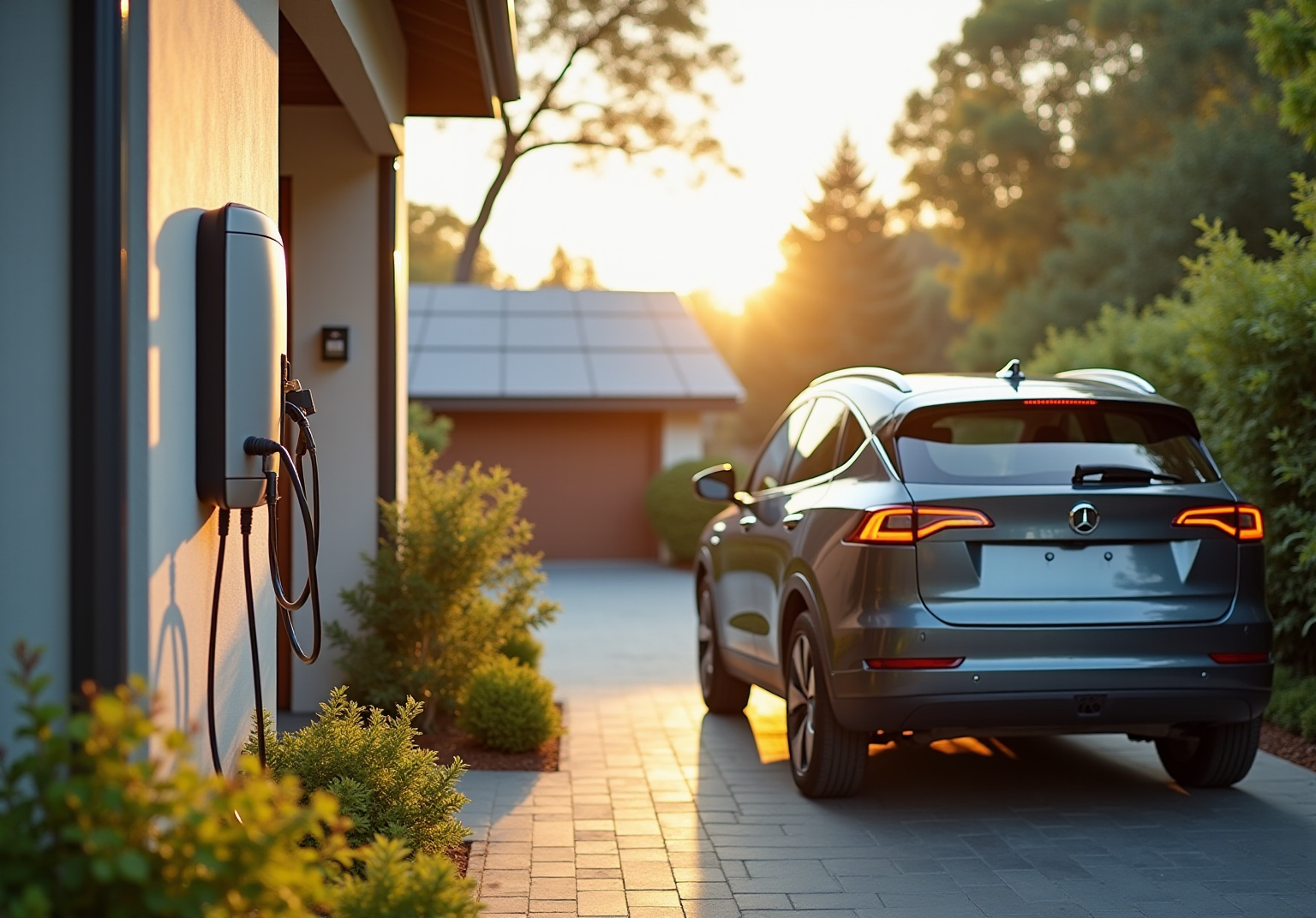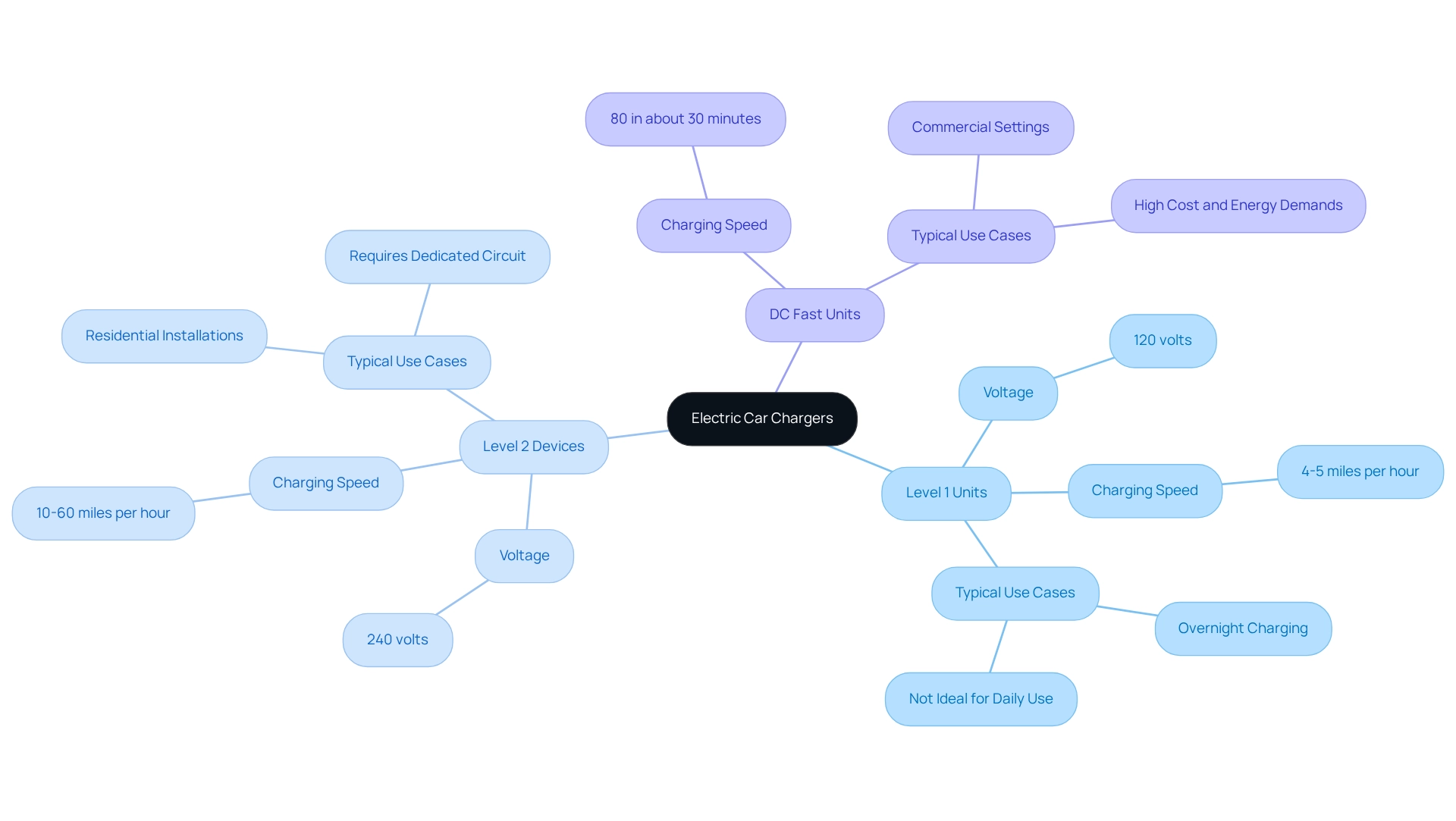Overview
We understand that managing energy bills can be a significant concern for homeowners. The cost of an electric car charger for home varies based on the type, with:
- Level 1 chargers priced between $130 and $300
- Level 2 chargers ranging from $400 to $700
Additionally, installation costs can add an extra $500 to $3,000. However, it’s important to consider the long-term benefits of home charging. Not only does it lead to substantial savings on fuel, but it can also increase your property value. This makes investing in a home charger a financially sound decision that contributes to energy independence. Together, we can explore these options and find the best solution for your needs, ensuring a brighter and more sustainable future for your home.
Introduction
As electric vehicles (EVs) become increasingly popular, we understand that many homeowners are concerned about the rising costs of energy and the need for efficient, accessible charging solutions. By familiarizing yourself with the different types of electric car chargers—Level 1, Level 2, and DC Fast Chargers—you can make informed decisions that align with your driving habits and energy needs. This article will explore the unique features of each charger type, evaluate the costs associated with purchasing and installing them, and outline the essential steps for a successful installation.
Additionally, we will highlight the numerous benefits of having a home EV charger, from significant cost savings to increased property value. Together, we can navigate this transition into the electric vehicle era and embrace the myriad advantages that come with it.
Understand Electric Car Chargers: Types and Features
Electric vehicle power sources are categorized into three main types: Level 1, Level 2, and DC Fast Units, each designed to meet different energy needs.
- Level 1 Units: Utilizing a standard 120-volt outlet, Level 1 units are the slowest option, typically providing about 4-5 miles of range per hour. While they can be suitable for overnight charging, we understand that they may not be the best choice for daily use, especially for those with longer commutes.
- Level 2 Devices: Operating at 240 volts, Level 2 devices are the preferred choice for residential installations, delivering between 10 to 60 miles of range per hour. They require a dedicated circuit and are significantly faster than Level 1 options, making them a practical solution for most homeowners.
- DC Fast Units: Primarily found in commercial settings, DC Fast Units can charge to 80% in about 30 minutes. Due to their high cost and energy demands, they are not typically installed in residential areas.
Understanding these types of devices is crucial for selecting the right option based on your driving habits and home setup. As the electric vehicle market continues to grow, with considerable investments in charging infrastructure, we anticipate that the availability and features of residential charging devices will improve, providing even more efficient options for environmentally conscious homeowners. If you’re considering installation, Powercore Electric offers a variety of services, including the installation of Level 2 devices, which are ideal for residential use, to help you find out how much is an electric car charger for home. For more information on pricing and installation options, please reach out to Powercore Electric at (916) 699-8778 or email ryan.serrano@powercoreinc.net. Our dedicated team is here to help you choose the most suitable EV charging device for your needs and ensure a seamless installation process. Together, we can make your transition to electric driving a smooth and rewarding experience.
Evaluate Costs: Purchase and Installation Expenses
We understand that many homeowners are concerned about how much is for home. It’s important to consider both the charger and installation specifics to make an informed decision.
-
Charger Costs:
- Level 1 chargers typically range from $130 to $300.
- Level 2 chargers generally cost between $400 and $700.
- DC Fast Chargers, while exceeding $1,000, are generally not recommended for residential use due to their high cost and installation complexity.
-
- Basic installation for a Level 2 charger can range from $500 to $2,500, influenced by the existing electrical system and any necessary upgrades.
- Homes requiring additional wiring or a new circuit may see installation costs rise significantly, sometimes exceeding $3,000.
-
Total Estimated Costs:
When combining the purchase and installation, homeowners can expect to invest between $1,000 and $3,000 for a Level 2 charger setup. Additionally, exploring local incentives or rebates can provide financial relief, making the transition to electric vehicle charging more affordable. Understanding these costs is crucial for homeowners looking to invest in EV infrastructure, ensuring they are well-prepared for the financial commitment involved. Together, we can navigate this journey towards energy independence, ensuring that your transition is as smooth and supportive as possible.
Plan Your Installation: Steps and Requirements
To successfully set up an electric vehicle charging station at your residence, it’s important to follow these essential steps with care and consideration:
- Evaluate Your Electrical System: We understand that you may have concerns about your residence’s electrical capacity. Start by determining if your electrical panel can support the extra demand of an EV device. Typically, a 200-amp service is required for a Level 2 device, which is the most common type for home installations. Powercore Electric conducts a thorough site assessment to determine the best location for your charging station and assess any electrical requirements.
- Choose the Right Location: Selecting a convenient and accessible location for the charger is key, ideally near your parking area. Ensure that the selected location adheres to local codes and regulations to facilitate a smooth setup process. Obtain Necessary Permits: It’s common to feel overwhelmed by the permitting process, but checking with your local building department will clarify whether a permit is required for the setup. Permits are often necessary for electrical work to ensure compliance with safety standards.
- Hire a Certified Electrician: Employ a certified electrician who specializes in EV charging solutions. Their expertise will ensure that the setup complies with safety standards and local regulations, minimizing potential issues. Install the Device: The electrician will proceed with the installation, which may involve hardwiring the unit directly to your electrical panel or setting up a dedicated outlet, depending on your home’s configuration. If needed, Powercore Electric may carry out electrical upgrades to support the station. Test the Charger: Once installed, the charger should be thoroughly tested to confirm it operates correctly and safely. Powercore Electric rigorously tests the power station to ensure optimal functionality before handing it over to you.
Take the time to familiarize yourself with its features and operation to maximize its benefits, and understanding how much is for home is crucial, as it ensures a successful setup and contributes to the growing electric vehicle market. For example, knowing how much is an electric car charger for home can enhance your property’s value, making it an appealing aspect for prospective buyers in environmentally aware markets. Additionally, local utilities may offer incentives, such as Clark Public Utilities providing $500 for installing an Energy Star device, which supports the transition to sustainable energy practices. Together, we can make strides towards a more sustainable future.
Maximize Savings: Benefits of Home EV Charging
Setting up a residential EV station offers various benefits that go beyond simple convenience, and we understand that many homeowners are looking for ways to manage their energy bills effectively:
- Cost Savings: Refueling at home is generally more affordable than relying on public power sources. Homeowners can achieve significant savings on fuel expenses, especially by recharging during off-peak hours when electricity rates are reduced. This can lead to considerable yearly savings, particularly for individuals traveling an average of 1,250 miles each month.
- Convenience: Imagine powering your vehicle overnight right at your residence, eliminating the need for regular visits to public power stations. This is especially beneficial for those with busy schedules, allowing for a seamless integration of power replenishment into daily routines.
- Increased Property Value: Homes equipped with EV stations frequently see a rise in property value. In eco-conscious markets, many potential buyers view residential energy supply capabilities as a highly sought-after feature, making properties with EV chargers more appealing. Real estate experts have noted that homes with electric vehicle stations can command higher prices, reflecting the growing interest in sustainable living options.
- Environmental Impact: By utilizing residential electric vehicle refueling, particularly when powered by solar energy, homeowners can reduce their dependence on fossil fuels and lower their carbon footprint. This aligns beautifully with the increasing consumer preference for environmentally friendly practices.
- Control Over Charging: Home charging provides the flexibility to manage when and how much you charge, allowing you to take advantage of lower electricity rates and optimize energy consumption. This level of control not only enhances convenience but also contributes significantly to overall cost savings.
In summary, the benefits of installing encompass financial savings, increased property value, convenience, and a positive environmental impact. Together, these factors make it a wise investment for homeowners. Let’s work towards a more sustainable future, one charge at a time.
Conclusion
Understanding the various types of electric car chargers is essential for homeowners looking to embrace electric vehicle ownership. We know that choosing the right charger can feel overwhelming, but let’s break it down together. Level 1, Level 2, and DC Fast Chargers each offer unique features tailored to different charging needs. While Level 1 chargers are slower and best for overnight use, Level 2 chargers provide a practical and efficient solution for home installations. DC Fast Chargers, although powerful, are typically reserved for commercial settings due to their high costs and installation complexities.
Evaluating the costs associated with these chargers reveals a significant investment, particularly for Level 2 setups, which can range from $1,000 to $3,000 when considering both purchase and installation. It’s common to feel concerned about these expenses, but awareness of potential rebates and incentives can alleviate some financial burdens, making the transition to electric vehicle charging more accessible.
Planning for installation involves careful assessment of your home’s electrical system, choosing a suitable location, obtaining necessary permits, and hiring qualified professionals. These steps not only ensure a successful installation but also enhance your property’s value and appeal in the ever-evolving real estate market.
Ultimately, the advantages of having a home EV charger extend far beyond convenience. Homeowners can benefit from substantial cost savings, increased property value, and a positive environmental impact. Embracing this technology not only facilitates a smoother transition to electric vehicles but also aligns with a growing commitment to sustainable living. Investing in home charging infrastructure is not just a practical choice; it is a step towards a more eco-conscious future. Together, we can make this transition smoother and more rewarding for everyone.



